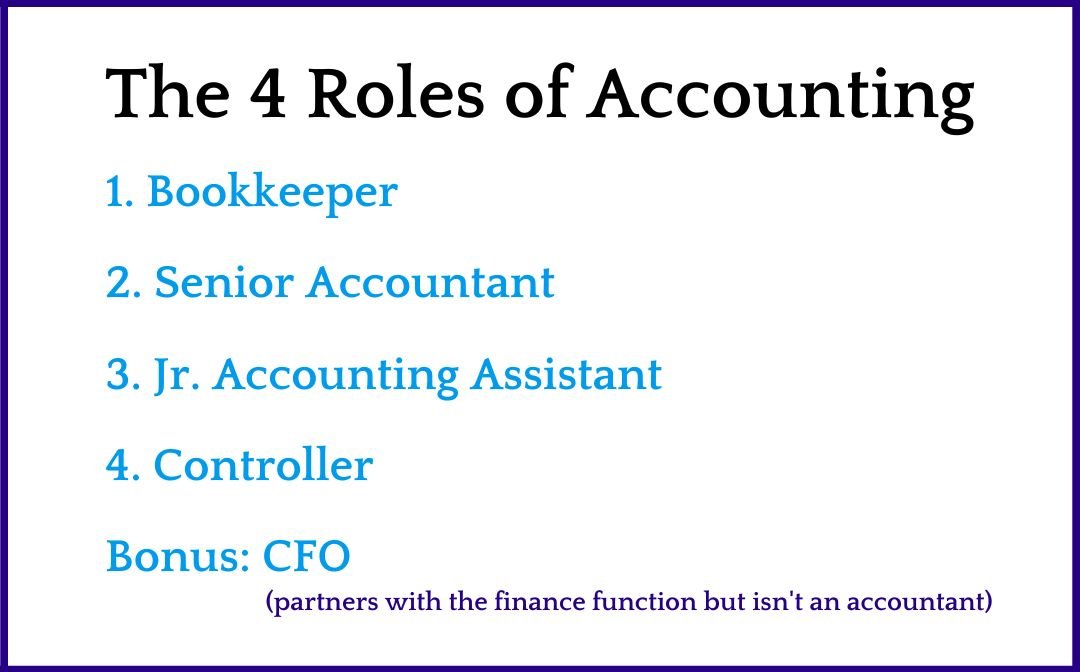How to Build an Accounting Team: Accounting Department Structure Best Practices
You are a passionate founder, leader, and CEO. You have a vision of where you want your company to go and the legacy you want to leave behind. You’re knowledgeable in your industry but don’t have a background in accounting and finance or the bandwidth, skills, or desire to manage your company finances. You need an accounting team to get the job done. If this sounds like you, keep reading to better understand accounting department structure best practices and responsibilities, including who to hire first to help your company thrive.
Major Accounting Department Positions for Your Finance Function
There are four different accounting roles to consider when setting up an accounting department:
Bookkeeper
Senior Accountant
Accounting Assistant/Jr. Accountant
Controller
Bonus: CFO (partners with the finance function but isn’t an accountant)
At Brady CFO, I offer fractional CFO services to help you understand and use your finance team’s reports to forecast the company’s future. That means you need team members to provide the boots-on-the-ground accounting functions. If you’re unsure which of the different accounting roles you need to fill, I can help you create a hiring plan that makes sense for your business.
Accounting Department Structure and Responsibilities
Depending on your company’s annual revenue and financial goals, you might not need to fill each position immediately. Still, it’s valuable to know the core accounting department hierarchy as your business grows.
1. Bookkeeper
This is a generalist accountant that can comprehensively perform all accounting functions. Some bookkeepers are highly qualified and excellent team members. However, others are terrible, calling themselves bookkeepers because they can get by but don’t have education or experience in the role. Because no degree or certification is required to call yourself a bookkeeper, it’s essential to do your due diligence when hiring or outsourcing a bookkeeper.
2. Senior Accountant
This role is typically filled by someone with a Bachelor's degree in Accounting or Finance. They often have additional accounting certifications, such as a CPA. A Senior Accountant is an excellent first hire within your business once you decide to hire internally. This role can handle all accounting and financial reporting tasks and interface with your tax advisor just fine.
3. Accounting Assistant/Jr. Accountant
This role tends to report to a Senior Accountant, Accounting Manager, or Controller. They focus on specific tasks in AR and/or AP functions. Because this position isn’t as comprehensive as a Senior Accountant, they are typically filled by recent grads without much accounting experience who still need to be mentored and trained.
4. Controller
A Controller is the highest accounting role in a company. They lead your accounting function and oversee Senior Accountants and Accounting Assistants/Jr. Accountants. A company usually doesn’t need a Controller until its accounting team has 2-3 staff members to manage. This is because controllership requires team management skill sets that a Senior Accountant may not possess. This is the key difference between the two. Both are often technically proficient, but a Controller should be able to lead and oversee a team. The Controller is the top accountant expected to complete all accounting tasks and provide financial reports to the CFO.
Bonus: CFO
Although the Chief Financial Officer title has the word “financial” in it, a CFO is not an accountant. Instead, CFOs use the financial reporting completed by a Controller to conduct analysis, forecast the future, and present to key stakeholders for decision-making. Stakeholders can include bankers, investors, board members, and of course, the CEO and executive suite.
The CFO’s role is to analyze the financial reports to determine company performance and help the CEO identify an improvement plan. The CFO is also in charge of obtaining needed financing to finance growth. That can be accomplished through strategic banking/credit facilities or investor relationships. Ultimately, the CFO is in charge of helping the company have enough financing to grow and be sustainable.
At Brady CFO, I work with businesses in America’s backbone industries, including food service and production, warehousing and distribution, construction, agriculture, professional services, and more. While there are exceptions, for those with $10-$30 million in annual revenue, I generally suggest hiring a full-time Controller to track historical results and a part-time CFO (like Brady CFO) to use data to forecast and plan for a prosperous future.
Accounting Department Structure Best Practices
To ensure you succeed in setting up an accounting department, following these three accounting department structure best practices is paramount.
1. Hire Well
When deciding who to hire and when it’s essential never to skimp by hiring cheap. Good financial reporting and accounting statements are critical as you grow. A lack of quality bookkeeping will result in…
A lack of ability to forecast
A struggle to obtain needed equity and credit financing
A cheap price for your business if and when you decide to sell
I can’t emphasize enough that you want to hire knowledgeable, experienced, and skilled team members for the different accounting jobs. I have encountered frustrated clients way too often that end up hiring talent at very expensive rates later on to fix the mistakes of cheaper bookkeepers. Whether you outsource accounting or hire in-house team members, hire well the first time to save yourself time and costly mistakes.
2. Hire in the Right Order
Most smaller businesses can suffice for a long time with an outsourced bookkeeper. I suggest this. Don't hire internally until you are ready for a full-time team member. But, once you have grown to that point where you need more dedicated attention in your accounting, your first hire should be a strong Senior Accountant. You don’t want an “Accounting Clerk.” A Clerk does not have the capability to run and manage your accounting function. They will often need to be highly directed and guided.
You can differentiate between an Accounting Clerk and Senior Accountant by their background, education, and experience. A Senior Accountant typically has a Bachelor’s degree in Accounting, an accounting designation such as a CPA or CMA, and experience being in charge of all bookkeeping functions and supervising different accounting roles. Without a Senior Accountant, as the business owner, you will find yourself stuck in providing accounting oversight and management when you should be spending time elsewhere.
As you grow, you’ll want to hire a mix of Accounting Clerks/Assistants/Jr. Accountants and eventually a Controller. A Senior Accountant can be promoted to a Controller position if they’re ready to take on the responsibility, as a Controller requires much of the same capabilities and skill sets as a Senior Accountant. However, they should also be able to assist with unique financial reporting needs, budgeting, and forecasting. They should also have strong leadership and management skills, as they will be leading a larger team.
3. Hire a Fractional CFO to Help You Strategize Your Accounting Department Structure
It can be challenging to keep up with your company's financial responsibilities while also focusing on growth and development. One way to alleviate this burden and prioritize strategic planning is to hire a fractional CFO.
Work with Brady CFO and Confidently Move Your Accounting Function Forward
At Brady CFO, I help values-driven business owners in America’s backbone industries with $1M-$30M in annual revenues solve their cash flow and financial performance frustrations with strategic financial planning and leadership. Achieving present and future success for your company may require setting up an accounting department with qualified individuals. I can help you make informed decisions based on your budgeting, investment, team building, and risk management goals.
Whether you want to expand your business or streamline operations, fractional CFO services from Brady CFO can be an invaluable asset in achieving long-term financial success. Utilizing our risk-free Financial Clarity Assessment is the best way to learn about our services and see if we’re a good fit.
During this process, we assess past financial performance and identify areas of opportunity and risk. We also benchmark your company against industry peers and develop a KPI scorecard to use going forward. Finally, we develop a preliminary scenario forecast for your business to evaluate various net income, EBITDA, and cash flow scenarios.
The best part is that it comes with a 100% Satisfaction Guarantee. If you don’t like our deliverable, you get your money back. It’s a perfect way to decide if you want to work together with zero risk. Contact us today to get started.

